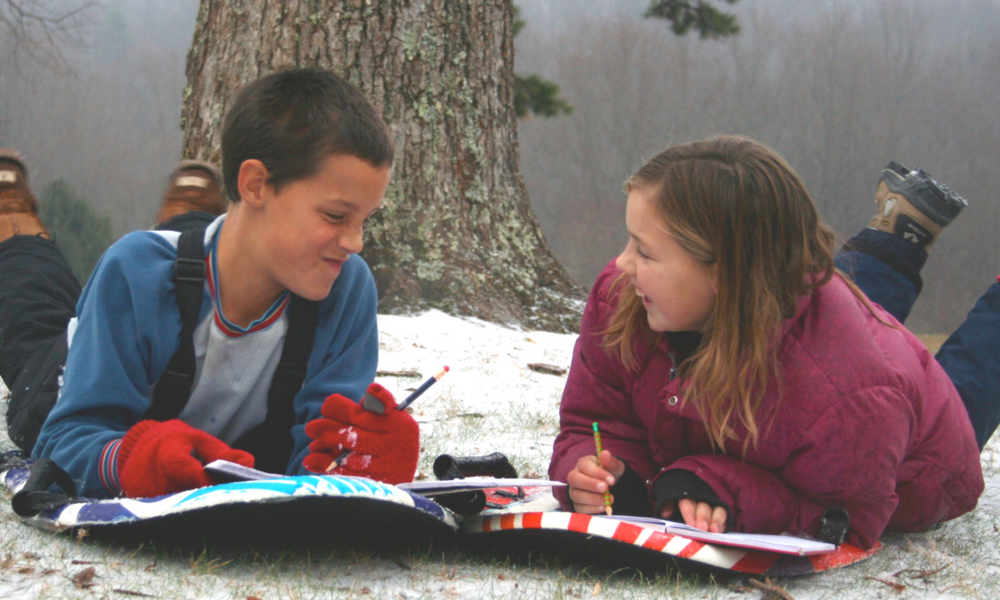Freewriting: The Key that Unlocks the Words

For most people writing from scratch is a challenge. For children, it's daunting. Don't expect the blank page and a pen to unleash creativity and fluid prose.
Instead, supply ample experience with the subject (engage the five senses, read several different perspectives, watch movies or visit sites, and talk about the subject with your children). Allow your child to spend time digesting and mulling over the topic. Once your student has a sense of ownership of the subject for writing, it is time to get some words on paper. Here's how.
Guidelines for freewriting #
Set the timer for ten minutes (3-5 minutes if it's the first month). Rub your kids' shoulders. Encourage them to wiggle, flex their fingers, crack their necks and adjust their papers and chairs.
Read these guidelines to your kids.
- Keep the pencil moving without stopping for ten minutes. (It's okay to start with 3 or 5 minutes, if that feels better to your kids.)
- Write everything that comes to mind, even seemingly unrelated comments like, "I hate writing. This is too hard. I don't think I would have liked Columbus if I had met him."
- Don't self-edit. Allow for bad handwriting, poor spelling, grammatical errors, sentence fragments, lists of verbs, little arrows, or quick drawings. Get it all down without worry about how it looks or whether or not it is right.
- Be outrageous. Use vocabulary and descriptions that sound overboard, silly, or absurd. Make comparisons and connections to other subjects (even if they seem at first glance to be irrelevant or unrelated).
- Keep writing, no matter what, until the bell rings, and then stop.
After a freewrite: Guidelines for the student #
- Take a break. Drink a glass of water, do ten jumping jacks, run around the block, or take a break on the couch.
- Come back to your paper without a pencil and just read it.
- Do not let your mom or dad read your writing yet. If you'd like to, you may read it aloud to them. (Mom and Dad: Do not read a freewrite before you hear it. You will undoubtedly miss the brilliance for all the spelling and grammatical errors. Instead, look for the continuity of thought, the bursts of expression, and the flashes of insight. Do not think of this raw writing as the finished product.)
- Feel free to underline any part you might wish to expand later.
Guidelines for Parent #
After a few days or a week has gone by, it's time for your feedback. Begin by identifying the core elements that are strong. Find at least two. Example: "Virile is a wonderful descriptive term" or "I didn't know you knew how a tank worked." Be concrete and positive. The fact that your son or daughter actually filled several lines on a page with words is worthy of affirmation. You can simply say, "Thank you for writing the whole time."
If there is little developed content, it may be an indication that you asked for a freewrite before your child had absorbed enough material related to the topic. If this is the case, notice it without disapproving of the writing. Instead, say something like, "I see that we need to read a few more books about World War II. Good start."
If there is enough content to work with, begin to lead your child to discover ways to expand and improve what was written. Ask questions like, "Which countries fought in the war?" or "Can you describe how the cocoa looked in addition to how it tasted?"
Highlight these areas that need development. Bring a clean sheet of paper to your writer. Freewrite again, focused on one specific area of content. This process can occur indefinitely in the generative stage of writing (and kids figure that out, so limit the development to two or three ideas, not all of them). Be careful not to require too much writing in a single day so as to keep the words fresh and prolific. Don't tire your young writers and thereby crush their enthusiasm.
Caution: When beginning to use freewriting in your home, skip the editing phase (mopping up the mechanics) for a while. Begin by affirming any work that is written. If your child chooses to share his or her writing with you, enjoy it and ask for the chance to share it with the other parent or grandparent. Expand the number of people who get to enjoy your child's raw writing. After your child really believes that you value content over the mechanics, that is the time to introduce the notion of editing the writing for accuracy.
In all things, be sensitive to your child's process. Each child is different and deserves a tailor-made writing program.

For Julie's hand-lettered Freewriting PDF sign up here.
(Image by Brave Writer mom, Colleen)
